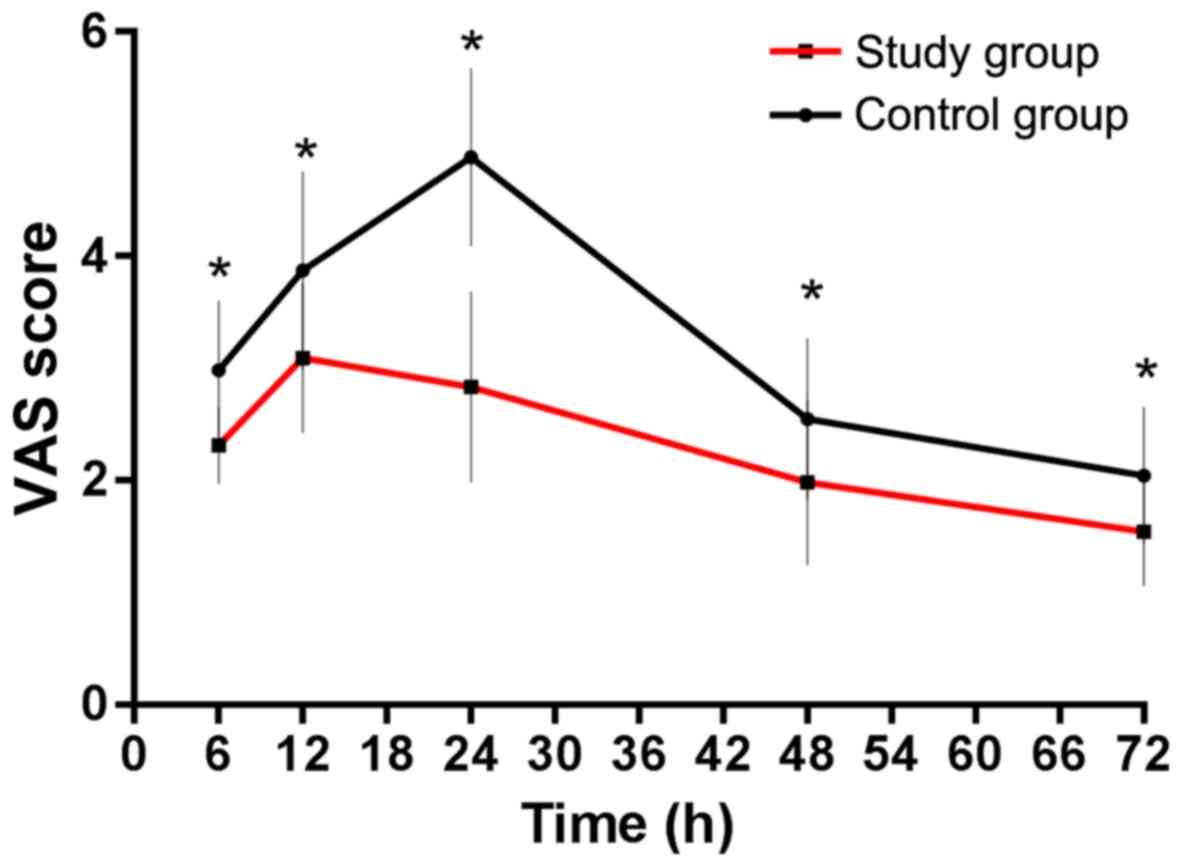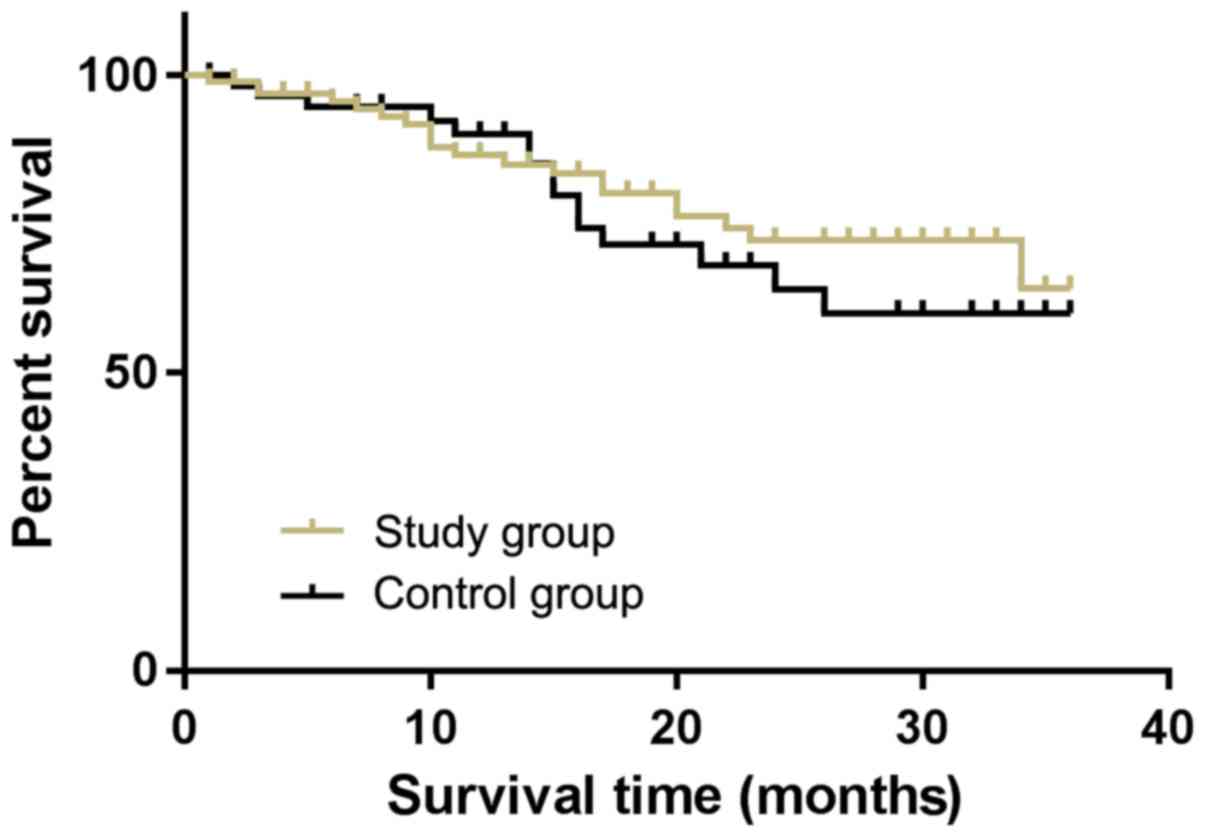|
1
|
Ren XL, He GY, Li XM, Men H, Yi LZ, Lu GF,
Xin SN, Wu PX, Li YL, Liao WT, et al: MicroRNA-206 functions as a
tumor suppressor in colorectal cancer by targeting FMNL2. J Cancer
Res Clin Oncol. 142:581–592. 2016. View Article : Google Scholar : PubMed/NCBI
|
|
2
|
Leufkens AM, Van Duijnhoven FJ, Boshuizen
HC, Siersema PD, Kunst AE, Mouw T, Tjønneland A, Olsen A, Overvad
K, Boutron-Ruault MC, et al: Educational level and risk of
colorectal cancer in EPIC with specific reference to tumor
location. Int J Cancer. 130:622–630. 2012. View Article : Google Scholar : PubMed/NCBI
|
|
3
|
Goldvaser H, Purim O, Kundel Y,
Shepshelovich D, Shochat T, Shemesh-Bar L, Sulkes A and Brenner B:
Colorectal cancer in young patients: Is it a distinct clinical
entity? Int J Clin Oncol. 21:684–695. 2016. View Article : Google Scholar : PubMed/NCBI
|
|
4
|
Zheng Y and Wu C: Prevalence and trend of
gastrointestinal malignant tumors in the elderly over 75 years old
in China]. Zhonghua Wei Chang Wai Ke Za Zhi. 19:481–485. 2016.(In
Chinese). PubMed/NCBI
|
|
5
|
Lloyd SC: Methods and systems for
improving the prevention of colorectal cancer. US Patent US
2014/0323802A1. March 10–2014.October 30 2014.
|
|
6
|
Alam DW and Amin A: Quality of life and
well-being ranking of selected districts of Khyber Pakhtunkhwa,
Pakistan. Soc Indic Res. 137:1–11. 2018. View Article : Google Scholar
|
|
7
|
Frass M, Friehs H, Marosi C,
Zedtwitz-Liebenstein K and Zielinski C: Life quality and subjective
feeling with additional homeopathic treatment in cancer patients.
Eur J Integr Med. 1:223–224. 2009. View Article : Google Scholar
|
|
8
|
Kaseda Y, Ikeda J, Sugihara K and
Kohriyama T: The therapeutic effects of low-frequency rTMS on hand
function and quality of life in chronic stroke patients relating to
functional integrity of the corticospinal tract. J Neurol Sci. 381
(Suppl):6002017. View Article : Google Scholar
|
|
9
|
Nowinski CJ, Siderowf A, Simuni T, Wortman
C, Moy C and Cella D: Neuro-QoL health-related quality of life
measurement system: Validation in Parkinson's disease. Mov Disord.
31:725–733. 2016. View Article : Google Scholar : PubMed/NCBI
|
|
10
|
Temporelli PL and Giannuzzi P: Cardiac
rehabilitation after cardiac surgery: A valuable opportunity that
should not be missed. Eur J Cardiovasc Prev Rehabil. 15:128–129.
2008. View Article : Google Scholar : PubMed/NCBI
|
|
11
|
Jia W, Liu W and Qiao X: Chinese expert
consensus on enhanced recovery after hepatectomy (version 2017).
Asian J Surg. 42:11–18. 2019. View Article : Google Scholar : PubMed/NCBI
|
|
12
|
Robbins CE, Casey D, Bono JV, Murphy SB,
Talmo CT and Ward DM: A multidisciplinary total hip arthroplasty
protocol with accelerated postoperative rehabilitation: Does the
patient benefit? Am J Orthop (Belle Mead NJ). 43:178–181.
2014.PubMed/NCBI
|
|
13
|
Zhang YG, Zhu G, Zhu SC, Liu M, Zhang YQ,
Jin B, Wei D, Wan B and Wang JY: Comparison of natural orifice
transumbilical endoscopic surgery versus conventional laparoscopic
surgery in renal cyst deroofing. Zhonghua Yi Xue Za Zhi.
92:276–278. 2012.(In Chinese). PubMed/NCBI
|
|
14
|
Laudicella M, Walsh B, Munasinghe A and
Faiz O: Impact of laparoscopic versus open surgery on hospital
costs for colon cancer: A population-based retrospective cohort
study. BMJ Open. 6:e0129772016. View Article : Google Scholar : PubMed/NCBI
|
|
15
|
Young PE, Womeldorph CM, Johnson EK,
Maykel JA, Brucher B, Stojadinovic A, Avital I, Nissan A and Steele
SR: Early detection of colorectal cancer recurrence in patients
undergoing surgery with curative intent: Current status and
challenges. J Cancer. 5:262–271. 2014. View
Article : Google Scholar : PubMed/NCBI
|
|
16
|
Patel S, Lutz JM, Panchagnula U and Bansal
S: Anesthesia and perioperative management of colorectal surgical
patients - A clinical review (part 1). J Anaesthesiol Clin
Pharmacol. 28:162–171. 2012. View Article : Google Scholar : PubMed/NCBI
|
|
17
|
Du YP, Li LL, He Q, Li Y, Song H, Lin YJ
and Peng JS: Nutritional risk screening and nutrition assessment
for gastrointestinal cancer patients. Zhonghua Wei Chang Wai Ke Za
Zhi. 15:460–463. 2012.(In Chinese). PubMed/NCBI
|
|
18
|
Bao Y, Lyu G, Shao L, Sun X, Cao X, Wang
L, Zhu C and Jia J: Influence of Jianpi Tiaogan Wenshen Recipe on
abdominal pain Visual Analogue Score (VAS) and defecation of
patients with diarrhea-predominant irritable bowel syndrome. Chin
Arch Trad Chin Med. 3:650–652. 2015.(In Chinese).
|
|
19
|
Gamal RM, Mahran SA, Abo El Fetoh N and
Janbi F: Quality of life assessment in Egyptian rheumatoid
arthritis patients: Relation to clinical features and disease
activity. Egypt Rheumatol. 38:65–70. 2016. View Article : Google Scholar
|
|
20
|
Ress AL, Perakis S and Pichler M:
MicroRNAs and colorectal cancer: Cancer. In: microRNA: Cancer -
From Molecular Biology to Clinical Practice. Gaetano S (ed).
Springer International Publishing. (Switzerland). 89–103.
2015.PubMed/NCBI
|
|
21
|
Ahmed S, Johnson K, Ahmed O and Iqbal N:
Advances in the management of colorectal cancer: From biology to
treatment. Int J Colorectal Dis. 29:1031–1042. 2014. View Article : Google Scholar : PubMed/NCBI
|
|
22
|
Schrom T, Horenburg L, Holz S and Paschen
C: Evaluation of quality of life following prosthetic replacement
of the auricle. HNO. 58:134–141. 2010.(In German). View Article : Google Scholar : PubMed/NCBI
|
|
23
|
Cheng Y, Jiang ZS, Xu XP, Zhang Z, Xu TC,
Zhou CJ, Qin JS, He GL, Gao Y and Pan MX: Laparoendoscopic
single-site cholecystectomy vs three-port laparoscopic
cholecystectomy: A large-scale retrospective study. World J
Gastroenterol. 19:4209–4213. 2013. View Article : Google Scholar : PubMed/NCBI
|
|
24
|
Shao Z, Jin G, Ji W, Shen L and Hu X: The
role of fast-track surgery in pancreaticoduodenectomy: A
retrospective cohort study of 635 consecutive resections. Int J
Surg. 15:129–133. 2015. View Article : Google Scholar : PubMed/NCBI
|
|
25
|
Zhang LY, Liu ZJ, Shen L and Huang YG:
Application of cardiopulmonary exercise testing in enhanced
recovery after surgery. Zhongguo Yi Xue Ke Xue Yuan Xue Bao.
39:831–835. 2017.(In Chinese). PubMed/NCBI
|
|
26
|
Hawasli A, Kandeel A and Meguid A:
Single-incision laparoscopic cholecystectomy (SILC): A refined
technique. Am J Surg. 199:289–293; discussion 293. 2010. View Article : Google Scholar : PubMed/NCBI
|
|
27
|
Khansari M, Sohrabi M and Zamani F: The
useage of opioids and their adverse effects in gastrointestinal
practice: A review. Middle East J Dig Dis. 5:5–16. 2013.PubMed/NCBI
|
|
28
|
Zhuang Y: Cause analysis and treatment of
17 cases of low rectal cancer postoperative anastomotic fistula.
Chin Commun Doc. 34:50–51. 2014.(In Chinese).
|
|
29
|
Huang F, Liu SC, Shih SM, Tao YH, Wu JY,
Jeng SY and Chang P: Reducing the anxiety of surgical patient's
families access short message service. AMIA Annu Symp Proc.
2006:9572006.
|
|
30
|
Ding SN, Pan HY and Zhang JG: Reevaluation
of the methodological quality in meta-analyses of accelerated
rehabilitation on recovery after surgery for colorectal cancer.
Zhonghua Yi Xue Za Zhi. 97:749–754. 2017.(In Chinese). PubMed/NCBI
|
















